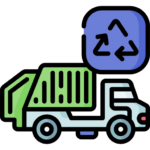Waste audit
Get in touch with our waste experts today
Just enter your business postcode…
Get in touch with our waste experts today
Just enter your business postcode…
Start saving now
A waste audit is an unbiased assessment of how waste is managed within your business.
Waste audits can benefit businesses of all sizes. They can be performed by industry experts who produce extremely detailed audit reports or by your own team.
This guide provides small business owners with a step-by-step approach to conducting their own waste audits. Here’s what we cover:
A commercial waste audit is designed to reduce commercial waste collection costs and minimise the environmental impact of your commercial waste.
These objectives are achieved through the following six specific aims of the waste audit:

Identify and minimise unnecessary waste generation through simple steps like cancelling unwanted magazine subscriptions or adopting digital solutions to eliminate ink cartridge and printer paper waste.

Prevent contamination of your recyclable waste. Contaminated waste is not recyclable, and your waste provider may charge you extra to send your waste to landfill if a greasy pizza box is found in your cardboard recycling.

Identify all recyclable waste types generated by your business, provide separate bins to ensure proper segregation, and then arrange for separate collections to take advantage of lower collection costs for segregated recyclables.

Identify recyclable items disposed of in general business waste and arrange for these to be collected separately to minimise expensive general business waste collections and exposure to the landfill tax.

Optimise the placement and labelling of smaller bins in the workplace to encourage recycling. Analyse the current capacity of commercial waste bins to avoid issues with overfilling between collections.

Ensure compliance with national and local commercial waste regulations and ensure paperwork, such as waste transfer notes, are retained.
We’ve summarised the business waste audit into nine distinct steps that will allow you to conduct your own audit.
We recommend assembling a team familiar with your business operations and involving employees who manage your waste day-to-day.
Ensure that your team is provided with the necessary safety equipment, including gloves, to safely handle waste during the audit.

Assess the waste your business generates to identify opportunities for reduction. The best way to manage waste is to avoid producing it altogether. Some opportunities are universal, such as using mugs instead of disposable coffee cups, but the best opportunities are specific to your business. Visit our business waste minimisation page for ideas.

Categorise the waste your business produces into the following widely available commercial waste collection types:

For each type of waste identified, calculate the number of bin bags your business generates for each type of waste. This will help you determine the size of the commercial waste bin required and how often it will need to be collected.

For each type of waste you’ve identified, place a clearly labelled waste bin where it is generated. By segregating the waste into its own bin at the source, you’ll reduce the risk of cross-contamination.

For each waste type, arrange for a dedicated waste collection (here’s where we can help: visit our commercial waste collections page). Your waste collection provider will deliver a new commercial waste bin to store the waste between pickups

Most waste audits result in improved waste segregation, which will require changes to waste management procedures. Communicate these changes to the relevant employees and emphasise the importance of avoiding waste cross-contamination.

For each of your new waste collections, your waste firm will issue your business with an annual waste transfer note. It’s essential to retain this documentation for two years. Check that this paperwork has been retained for previous waste collections.

After your new waste management processes have been in place for several months, revisit them to assess whether they are effective. Specifically, consider whether you’ve incurred any overweight or contamination charges from your waste providers.
To start, consider doing it yourself or involving someone from your team! For most businesses, a waste audit requires no specialised knowledge or expertise.
In fact, involving people who deeply understand your business operations has a significant advantage.
If you’re looking for outside help, our trusted local waste firms can send a waste auditor to your site to make recommendations. Most waste providers offer free, impartial waste audits to help you understand your waste needs and allow them to tailor their services to your requirements.
You can arrange an external waste audit today by entering a few simple details into the form at the top of this page.
No, commercial waste audits are not a legal requirement in the UK. However, conducting one is the best way to ensure your business complies with waste hierarchy requirements.
💡One exception is Hospitals, GPs, vets and dentists must periodically conduct a clinical waste audit.